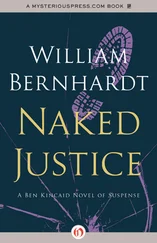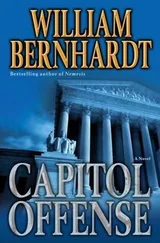“That’s not true! I didn’t—”
“I’ve seen you attack Keri myself. You admitted you attacked your husband. And I think you did it in Keri’s apartment, too. You obviously have a problem with your temper, ma’am. And although I’m no psychiatrist, I suspect your problems go even deeper than that.”
“How dare you! You don’t know what happened—”
“I think I do. You claim Keri made a lot of hateful threats to you as you were dragged out of the apartment by her brother. But why would she? She may have been shocked to learn that Joe had a wife, but she had no reason to believe he would leave her. He refused when you first asked him, something you’ve already admitted. And something you told Keri when you were at her apartment. He didn’t change his mind until later—after you worked on him some more. So what reason did Keri have to be making threats to you? None. None at all.” Ben leaned in closer. “I think you made it up, Mrs. McNaughton. You made it up because you hate Keri Dalcanton and you want to see her die.”
“That isn’t true!”
“I think it is. In fact, I know it is. The truth is, Keri has no reason to be telling lies about you. But you have every reason to tell lies about her. Because, as you’ve already admitted to the jury—you hate her.”
“That’s not so!” Andrea rose out of her chair. “Make him stop saying that!”
“You did lie, Mrs. McNaughton. You lied about the exercise machine and the threats and everything else. Anything that would make the police arrest Keri and pursue her relentlessly. Which they did. Because they felt they owed it to Joe’s poor widow.”
“Make him stop!” Andrea was screaming; almost out of control with rage. “Make him stop lying!”
“Your honor—”
Ben cut LaBelle off before he had a chance to interrupt. “And you told all those lies, Mrs. McNaughton, you stirred up the whole police department, because you hated that woman, you hated her with every ounce of your body, hated her so much you were willing to do anything—”
“ She stole my husband! ” Andrea’s impassioned screech reverberated across the courtroom. She leaned across the rail, almost flinging herself out of the box. “ She stole my husband! ”
Ben allowed the horrible silence following her outburst to fester. Andrea placed her hand against her temple, brushing the hair from her eyes, and lowered herself back to her chair, sobbing uncontrollably.
“And by that,” Ben said, “you don’t mean that she killed your husband, because she didn’t, and you know it. You mean she stole his love. She alienated his affections.”
Andrea’s head was bowed. Her voice was broken, her face shattered. “Whenever I think about the two of them, being together, doing all those disgusting things, I—I—just can’t stand it.”
Ben spoke quietly but insistently. “And so you decided to get back at her, the best way you knew how. By making sure she was Suspect Number One. By making sure the law-enforcement community hounded her relentlessly, never giving up until she had paid the final price for what she did to you. That’s what you wanted, wasn’t it, Andrea?”
Andrea’s face was wet and streaked. She looked broken and pathetic. “Was that so much?” she asked. “She took everything from me. Everything.”
Ben nodded, then looked up at the bench. “That’s all, your honor. I have no more questions for this witness. I think she’s been through enough.” He glanced back at the defendant’s table. “I think we all have.”
47
AFTER THE FURIOUS EXCITEMENT of the last two witnesses, closing arguments were almost an anticlimax. LaBelle predictably rehashed all the incriminating evidence, focusing for obvious reasons on the forensic exhibits rather than the testimony of Andrea McNaughton. He reminded everyone on the jury panel that it was uncontested that the murder weapon had come from Keri Dalcanton’s kitchen, that the chains had come from her bedroom, that her fingerprints were on both. And most compelling of all—that her skin was under Joe McNaughton’s fingernails.
“The defense has been very clever,” LaBelle cautioned them. “They’ve managed to come up with some explanation for almost every incriminating detail. Maybe the skin got under his nails during kinky sex. Maybe there was a fight when he told Keri he was breaking it off. On and on and on. But at some point you have to ask yourself—when do these stop being explanations, and start being excuses? Is it credible that there should be some outlandish, contrived explanation for every item in a mountain of evidence? Or is all of this simply proof of the obvious—that Keri Dalcanton killed Joe McNaughton in a fit of rage when he told her she would never see him again.”
LaBelle left the podium and approached the jury, appealing to them with his calm, logical delivery. Ben could see why he had the reputation he did. He wasn’t showy as such, but showy wasn’t always good in a criminal trial. He was assured and sincere, and in the end run, Ben knew that was much more important to most juries.
“Bear in mind, too,” LaBelle reminded them, “the psychiatrist who testified that Keri Dalcanton fantasized about killing Joe McNaughton long before she did—long before she ever had a reason. Even before his decision to end the relationship, murder was on her brain. Is that the dream of a normal, innocent lover? I should think not. That’s the dream of a twisted, dangerous mind. All she needed was a motive. And when Joe McNaughton finally gave it to her, she made her sick dream a reality.
“When Mr. Kincaid speaks to you, he will no doubt talk at great length about reasonable doubt. For the most part, I’ll leave that to him. But I will suggest to you, that the most important word in that phrase is not ‘doubt,’ but ‘reasonable.’ It is not enough for the defense to create doubts with wild speculations or crazy explanations. It is not enough to provide alternative explanations or—in a particularly crude effort—to pin the blame on the recently deceased who cannot defend themselves. There must be reasonable doubt. If there is no reasonable doubt that Keri Dalcanton killed Joe McNaughton, then you must deliver a guilty verdict. Indeed, you have a duty to do so. A duty you owe not just to me, or this court, but to everyone.”
Ben made a conscious decision not to protract his closing. He had a real sense that the trial was over, at least in the jury’s mind. In some cases, he felt the jury looked forward to closing; they wanted to hear the attorneys sort out the evidence and try to make sense of it all. But not this time. This time he felt the decision had been made—one way or the other. All he could do was remind them of everything he thought was important—and do them the courtesy of being brief.
Point by point, he identified the refutations made to all of the prosecution’s so-called evidence. “The prosecution wants to make much of the fact that the knife came from Keri’s kitchen—but she admitted that, just as she admitted that the chains came from her bedroom. What’s important is not where they came from—but who used them. Similarly, the prosecution wants to make a fuss about her fingerprints being on the knife and the chains. But why shouldn’t they be? They were hers! Of course she’s held the knife, and she’s admitted she used the chains. This so-called proof tells you nothing.”
Ben leaned against the counsel table. “I want to take an extra moment to discuss the DNA evidence. DNA has been much in the news lately. Possibly too much. It has acquired a veneer of infallibility—because most people don’t really understand it. They assume that DNA evidence equals guilt. But it doesn’t. Not always. All DNA evidence can do is give you a likelihood, that is, the odds that the specimen came from the accused. But as anyone who’s ever been to Vegas knows, odds don’t always play out the way you expect them to. And you have to consider—even if her skin was under his fingernails, does that prove she killed him? Or does that just prove they spent a lot of time together, some of it in close contact, something which has never been in dispute? Keri explained that she and Joe fought briefly when he announced that he was leaving her—an understandable reaction. Is it so hard to believe that the skin got under his fingernails during that struggle? The prosecutor talks about our ‘crazy explanations,’ but isn’t that explanation easier to believe than that this petite young woman killed him? I think it is. And if you’ll look into your hearts, I think you’ll find that it is, too.
Читать дальше








